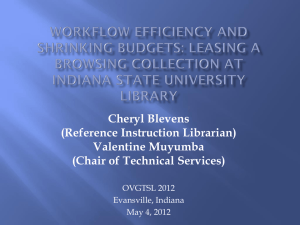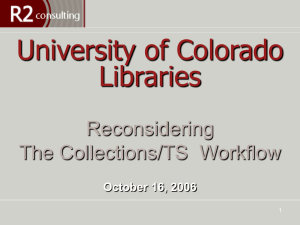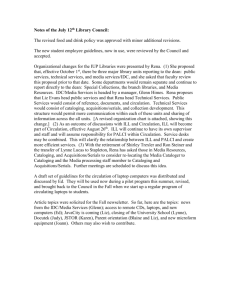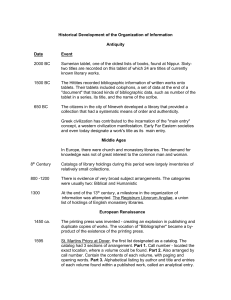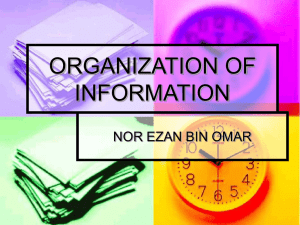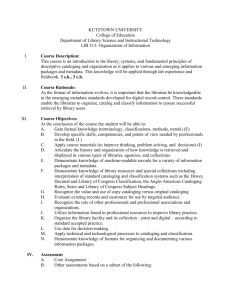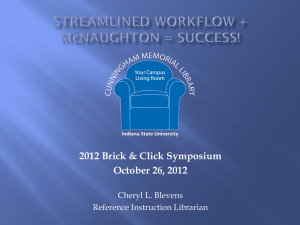Literature review: Assessment of Cataloging Services in an
advertisement
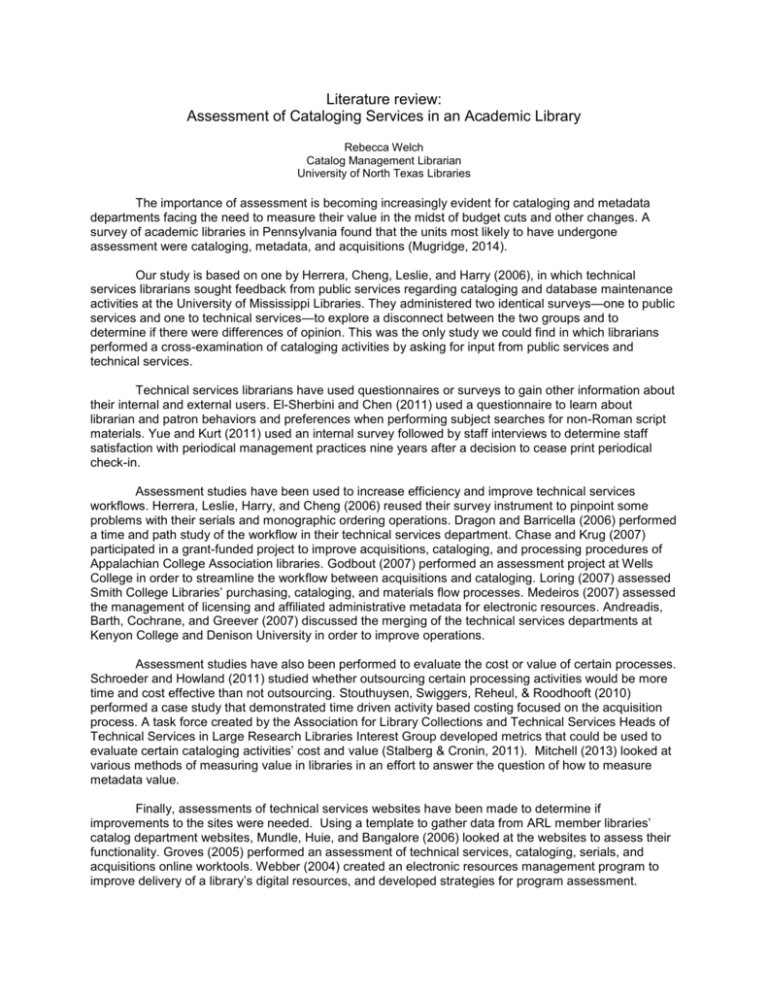
Literature review: Assessment of Cataloging Services in an Academic Library Rebecca Welch Catalog Management Librarian University of North Texas Libraries The importance of assessment is becoming increasingly evident for cataloging and metadata departments facing the need to measure their value in the midst of budget cuts and other changes. A survey of academic libraries in Pennsylvania found that the units most likely to have undergone assessment were cataloging, metadata, and acquisitions (Mugridge, 2014). Our study is based on one by Herrera, Cheng, Leslie, and Harry (2006), in which technical services librarians sought feedback from public services regarding cataloging and database maintenance activities at the University of Mississippi Libraries. They administered two identical surveys—one to public services and one to technical services—to explore a disconnect between the two groups and to determine if there were differences of opinion. This was the only study we could find in which librarians performed a cross-examination of cataloging activities by asking for input from public services and technical services. Technical services librarians have used questionnaires or surveys to gain other information about their internal and external users. El-Sherbini and Chen (2011) used a questionnaire to learn about librarian and patron behaviors and preferences when performing subject searches for non-Roman script materials. Yue and Kurt (2011) used an internal survey followed by staff interviews to determine staff satisfaction with periodical management practices nine years after a decision to cease print periodical check-in. Assessment studies have been used to increase efficiency and improve technical services workflows. Herrera, Leslie, Harry, and Cheng (2006) reused their survey instrument to pinpoint some problems with their serials and monographic ordering operations. Dragon and Barricella (2006) performed a time and path study of the workflow in their technical services department. Chase and Krug (2007) participated in a grant-funded project to improve acquisitions, cataloging, and processing procedures of Appalachian College Association libraries. Godbout (2007) performed an assessment project at Wells College in order to streamline the workflow between acquisitions and cataloging. Loring (2007) assessed Smith College Libraries’ purchasing, cataloging, and materials flow processes. Medeiros (2007) assessed the management of licensing and affiliated administrative metadata for electronic resources. Andreadis, Barth, Cochrane, and Greever (2007) discussed the merging of the technical services departments at Kenyon College and Denison University in order to improve operations. Assessment studies have also been performed to evaluate the cost or value of certain processes. Schroeder and Howland (2011) studied whether outsourcing certain processing activities would be more time and cost effective than not outsourcing. Stouthuysen, Swiggers, Reheul, & Roodhooft (2010) performed a case study that demonstrated time driven activity based costing focused on the acquisition process. A task force created by the Association for Library Collections and Technical Services Heads of Technical Services in Large Research Libraries Interest Group developed metrics that could be used to evaluate certain cataloging activities’ cost and value (Stalberg & Cronin, 2011). Mitchell (2013) looked at various methods of measuring value in libraries in an effort to answer the question of how to measure metadata value. Finally, assessments of technical services websites have been made to determine if improvements to the sites were needed. Using a template to gather data from ARL member libraries’ catalog department websites, Mundle, Huie, and Bangalore (2006) looked at the websites to assess their functionality. Groves (2005) performed an assessment of technical services, cataloging, serials, and acquisitions online worktools. Webber (2004) created an electronic resources management program to improve delivery of a library’s digital resources, and developed strategies for program assessment. References Andreadis, D. K., Barth, C. D., Cochrane, L. S., & Greever, K. E. (2007). Cooperative work redesign in library technical services at Denison University and Kenyon College. In M. Mitchell (Ed.), Library workflow redesign: Six case studies (39–49). Washington, DC: Council on Library and Information Resources. Chase, A., & Krug, T. (2007). New techniques in library technical services at the Appalachian College Association. In M. Mitchell (Ed.), Library workflow redesign: Six case studies (8-20). Washington, DC: Council on Library and Information Resources. Dragon, P., & Barricella, L. S. (2006). Assessment of technical services workflow in an academic library: A time-and-path study. Technical Services Quarterly, 23(4), 1–16. El-Sherbini, M., & Chen, S. (2011). An assessment of the need to provide non-Roman subject access to the library online catalog. Cataloging & Classification Quarterly, 49(6), 457–483. Godbout, M. (2007). Preparing an item for circulation while streamlining the workflow between the acquisitions and cataloging offices. Indiana Libraries 26(4), 59–67. Groves, D. (2005). Online work tools: A look at 20 academic libraries technical services Web pages. Library Collections, Acquisitions & Technical Services, 29(4), 395–402. Herrera, G., Cheng, D. T., Leslie, J., & Harry, T. (2006). Technical services cataloging and database maintenance assessment. Technical Services Quarterly, 23(3), 51–72. Herrera, G., Leslie, J., Harry, T., & Cheng, D. T. (2006). Technical services serials and monographic ordering assessment. Technical Services Quarterly, 24(1), 45–62. Loring, C. B. (2007). Increasing productivity through workflow redesign at Smith College. In M. Mitchell (Ed.), Library workflow redesign: Six case studies (50-59). Washington, DC: Council on Library and Information Resources. Medeiros, N. (2007). Managing electronic resources in the Tri-College Consortium. In M. Mitchell (Ed.), Library workflow redesign: Six case studies (60-72). Washington, DC: Council on Library and Information Resources. Mitchell, E. (2013). Assessing the value of metadata in information services. Technical Services Quarterly, 30(2), 187-200. Mugridge, R. L. (2014). Technical services assessment: A survey of Pennsylvania academic libraries. Library Resources and Technical Services, 58(2), 100-110 Mundle, K., Huie, H., & Bangalore, N. S. (2006). ARL library catalog department Web sites: An evaluative survey. Library Resources & Technical Services, 50(3), 173–185. Schroeder, R., & Howland, J. L. (2011). Shelf-ready: A cost-benefit analysis. Library Collections, Acquisitions & Technical Services, 35(4), 129–134. Stalberg, E., & Cronin, C. (2011). Assessing the cost and value of bibliographic control. Library Resources & Technical Services, 55(3), 124–137. Stouthuysen, K., Swiggers, M., Reheul, A., & Roodhooft, F. (2010). Time-driven activity-based costing for a library acquisition process: A case study in a Belgian university. Library Collections, Acquisitions & Technical Services, 34(2), 83–91. Webber, S. (2004). Applying program assessment techniques to electronic resources management. Technical Services Quarterly, 22(1), 9-20. Yue, P. W., & Kurt, L. (2011). Nine years after implementing the unthinkable: The cessation of periodical check-in at the University of Nevada, Reno. Serials Librarian, 61(2), 231–252.
